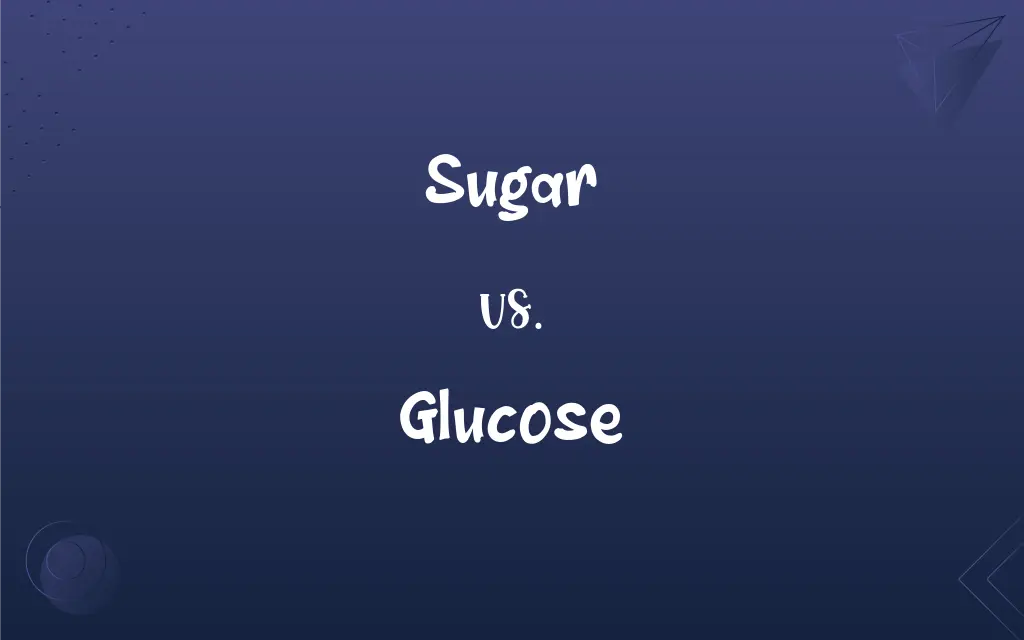Sugar vs. Glucose: What's the Difference?
Edited by Aimie Carlson || By Harlon Moss || Updated on October 7, 2023
Sugar refers to sweet-tasting carbohydrates, like sucrose from sugar cane, while glucose is a specific simple sugar used for energy in living organisms.

Key Differences
Sugar encompasses a variety of sweet, soluble carbohydrates that can be derived from various sources, such as sugar cane, beets, and fruits. The term "sugar" might refer to any carbohydrate that is present in food and tastes sweet. The most common sugar used in food preparation is sucrose, a disaccharide composed of two simpler sugars, glucose and fructose. The crystalized form of sucrose is often what we recognize as table sugar.
Glucose, on the other hand, is a specific monosaccharide, meaning it is one of the simplest forms of sugar. It is crucial for cellular respiration, providing energy for cellular activities throughout all living organisms. In human nutrition, glucose is paramount as a source of energy, and it plays a vital role in brain function. Unlike the generalized term "sugar," glucose denotes a particular molecule.
Moreover, sugar, due to its various forms, like sucrose, fructose, and lactose, can be found in numerous sources and may be utilized in a myriad of culinary and industrial applications. Sugar, especially sucrose, is utilized widely in the culinary world for its sweetening capabilities, providing not just sweetness but also influencing texture and other cooking properties.
Conversely, glucose is commonly encountered in the biological realm, often discussed in relation to metabolic processes and medical contexts, such as in discussions about blood sugar levels in diabetes management. Glucose's crucial role in biology cannot be overstated, as it is a primary energy source for cellular functions and a key player in metabolic processes.
Comparison Chart
Type
A general term for sweet-tasting carbohydrates.
A specific simple sugar, a monosaccharide.
ADVERTISEMENT
Source
Can be derived from various sources like sugar cane, beets, fruits, etc.
Produced in plants via photosynthesis and found in many foods.
Usage in Cooking
Widely used for sweetening, preservation, and texture.
Less sweet than sugar; used in specific cooking and medical situations.
Role in Biology
Discussed variously, depending on its specific type.
Vital for providing energy in living organisms.
Health Aspect
Consumption generally needs to be moderated.
Crucial to monitor in certain health conditions like diabetes.
Sugar and Glucose Definitions
Sugar
Sugar is a soluble carbohydrate that can be naturally occurring or added.
The sugar in the drink made it quite sweet.
ADVERTISEMENT
Glucose
Glucose is a monosaccharide, a simple sugar.
Glucose is essential for energy production in the body.
Sugar
Sugar contributes to the texture and browning of baked goods.
Without sugar, the cake lacked a golden-brown crust.
Glucose
Glucose serves as a primary energy source for cells.
The brain primarily uses glucose for energy.
Sugar
Sugar provides a quick source of energy when consumed.
Athletes sometimes consume sugar for a rapid energy boost.
Glucose
Glucose is used in medical tests and treatments.
The patient was given a glucose solution to test for diabetes.
Sugar
Sugar is a sweet substance often used to enhance food flavor.
She sprinkled some sugar on her cereal.
Glucose
Glucose is the sugar measured when checking blood sugar levels.
Doctors monitor the glucose levels of diabetic patients closely.
Sugar
Sugar acts as a preservative in jams and jellies.
The sugar in the jam prevents it from spoiling quickly.
Glucose
Glucose plays a crucial role in cellular respiration.
In cellular respiration, glucose is broken down to produce ATP.
Sugar
A sweet crystalline or powdered substance, white when pure, consisting of sucrose obtained mainly from sugarcane and sugar beets and used in many foods, drinks, and medicines to improve their taste. Also called table sugar.
Glucose
A monosaccharide sugar, C6H12O6, that is used by living things to obtain energy through the process of aerobic respiration within cells. It is the principal circulating sugar in the blood of humans and other mammals.
Sugar
Any of a class of water-soluble crystalline carbohydrates, including sucrose and lactose, having a characteristically sweet taste and classified as monosaccharides, disaccharides, and trisaccharides.
Glucose
A colorless to yellowish syrupy mixture of dextrose, maltose, and dextrins containing about 20 percent water, used in confectionery, alcoholic fermentation, tanning, and treating tobacco. Also called starch syrup.
Glucose
(carbohydrate) A simple monosaccharide (sugar) with a molecular formula of C6H12O6; it is a principle source of energy for cellular metabolism.
FAQs
Is glucose the same as blood sugar?
Yes, glucose is the type of sugar that is measured when assessing blood sugar levels.
Can glucose be used for baking like sugar?
While glucose can be used in baking, it has different properties and is less sweet than common sugar (sucrose).
What is sugar commonly used for?
Sugar is commonly used for sweetening foods and beverages.
Are sugar and glucose interchangeable in recipes?
Not always, as sugar and glucose have different sweetness levels and properties, affecting the outcome of the recipe.
Why is monitoring glucose important for diabetics?
Monitoring glucose is vital for diabetics to manage their blood sugar levels and prevent complications.
Can glucose levels in the blood be too low?
Yes, low blood glucose, known as hypoglycemia, can be dangerous, causing symptoms like shakiness, confusion, and in severe cases, unconsciousness.
Can eating sugar impact my glucose levels?
Yes, consuming sugar will impact glucose levels in the blood, especially noticeable in diabetic individuals.
What are the health implications of consuming too much sugar?
Excessive sugar consumption is linked to various health issues, including obesity, type 2 diabetes, and dental problems.
Is glucose present in all types of sugar?
Glucose can be a component in various sugars, like sucrose, but not in all types of sugar.
How does the consumption of sugar affect dental health?
Sugar consumption can lead to dental issues, as it provides food for bacteria in the mouth, leading to acid production, which can erode enamel and cause cavities.
Is “sugar-free” synonymous with “glucose-free”?
Not necessarily. "Sugar-free" usually refers to being free of sucrose, but the product might contain other sugars, like glucose.
How is sugar derived from plants?
Sugar is extracted and refined from certain plants, notably sugar cane and sugar beets, through a process of milling and purification.
What role does glucose play in cellular function?
Glucose is vital for cellular respiration, a process that produces energy (in the form of ATP) that cells use for various functions.
Can the body use other sugars like glucose for energy?
Yes, the body can utilize other sugars for energy, but glucose is the preferred source, especially for the brain.
Why do some recipes specify using "caster" sugar?
Caster sugar is a fine sugar that dissolves easily, making it suitable for certain recipes, like meringues, to prevent a grainy texture.
Is glucose always present in our diet?
While glucose is commonly present in our diet, particularly in carbohydrates, its direct form may not always be ingested.
What role does sugar play in fermentation?
In fermentation, microorganisms like yeast consume sugars (like glucose) and produce byproducts, such as alcohol and carbon dioxide.
What is the difference between natural and added sugars?
Natural sugars are found naturally in foods (like fruits), while added sugars are incorporated into foods during preparation or processing.
Are there alternative sweeteners that can be used instead of sugar?
Yes, there are numerous alternative sweeteners, such as stevia, aspartame, and agave nectar, each with distinct properties.
How does the body regulate glucose levels?
The body regulates glucose levels primarily through insulin, a hormone that helps cells take in glucose from the bloodstream.
About Author
Written by
Harlon MossHarlon is a seasoned quality moderator and accomplished content writer for Difference Wiki. An alumnus of the prestigious University of California, he earned his degree in Computer Science. Leveraging his academic background, Harlon brings a meticulous and informed perspective to his work, ensuring content accuracy and excellence.
Edited by
Aimie CarlsonAimie Carlson, holding a master's degree in English literature, is a fervent English language enthusiast. She lends her writing talents to Difference Wiki, a prominent website that specializes in comparisons, offering readers insightful analyses that both captivate and inform.































































